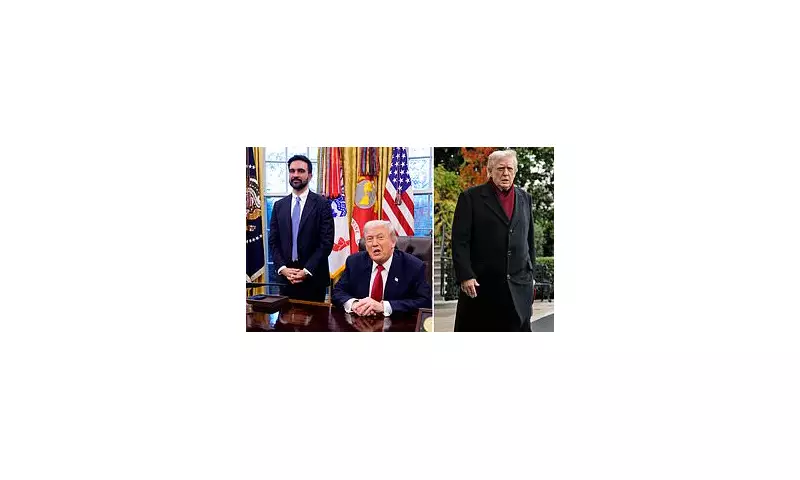
In a significant policy reversal, President Donald Trump has decided to pause the deployment of National Guard troops to New York City following a meeting with the city's newly elected Mayor Zohran Mamdani. The Republican leader, who had previously championed sending federal forces to Democrat-run cities as part of his crime reduction strategy, appears to have changed his approach toward his home city.
From Confrontation to Cooperation
During an interview on Saturday, President Trump indicated he would only proceed with National Guard deployment if necessary, noting that other locations currently require more urgent attention. When questioned by MS NOW reporter Akalya Gardner about his plans for New York, Trump responded: "If they need it. Right now, other places need it more, but if they need it."
The president spoke warmly about his Friday meeting with Mamdani at the White House, describing their discussion as "very good" and revealing they had specifically addressed the potential deployment. This represents a dramatic shift from his position just months earlier, when Trump insisted on sending troops to New York City as part of his broader strategy that began with promises to clean up Chicago, Illinois.
A Surprising Political Truce
The meeting between the political opponents produced several extraordinary moments, including when Trump addressed Mamdani's previous characterisation of him as a fascist. In a remarkable concession, the president told the mayor-elect: "You can call me it."
Trump expressed optimism about Mamdani's potential leadership, stating: "I hope that he's going to be a really great mayor. The better he does, the happier I am." He even suggested that conservatives might be surprised by the democratic socialist, who secured a landslide victory earlier this month and is viewed as an emerging leader within the Democratic party.
The two leaders discovered unexpected common ground during their discussion, particularly regarding housing affordability and economic concerns. "We talked about some things... like housing and getting housing built and food and prices and the price of oil," Trump noted. "We agree on a lot more than I would have thought. Some of his ideas are the same ones I have."
Previous Tensions Give Way to Pragmatism
This cordial meeting stands in stark contrast to the relationship both men maintained during the election campaign. Trump had repeatedly urged voters not to support the progressive candidate, endorsing former New York Governor Andrew Cuomo on the eve of election day and previously describing Mamdani as both a "communist" and a "lunatic."
The president had even threatened to withhold federal funds from New York City if Mamdani won, stating publicly that "if Communist Candidate Zohran Mamdani wins the Election for Mayor of New York City, it is highly unlikely that I will be contributing Federal Funds."
However, following their personal interaction, Trump declared he would "absolutely" live in a Mamdani-run New York City and expressed "very little doubt" that they could find agreement on crime policy. He particularly praised Mamdani's decision to retain Police Commissioner Jessica Tisch, whom he described as "a great police commissioner" and a friend of his daughter Ivanka Trump.
Official Resistance to Federal Intervention
When Trump initially threatened to deploy troops to New York City, several prominent officials pushed back vigorously. NYPD Commissioner Jessica Tisch met with U.S. Attorney General Pam Bondi to argue against the necessity of federal troop deployment.
Governor Kathy Hochul revealed she had called Trump directly to persuade him against sending federal forces into her city. "I said Mr. President, I can give you all the data you need to show that crime is down, it's working, our policies are working," Hochul recalled telling the president.
The governor characterised Trump's previous deployment threats as an attempt to "throw gasoline on a fire," asserting that New York had its own fires under control without requiring federal intervention.
Common Ground Beyond Ideology
Despite their significant political differences, Trump and Mamdani discovered several areas of agreement during their discussion. The mayor-elect noted they spoke about affordability and ICE operations in New York, along with strategies to reduce living costs as inflation continues to impact middle-class earnings.
Mamdani reflected on their meeting by observing: "I know that for tens of thousands of New Yorkers, this meeting is between two very different candidates who they voted for, for the same reason. They wanted a leader who would take on the cost-of-living crisis that makes it impossible for working people to afford living in the city."
The two leaders share more commonalities than might initially appear, including connections to New York City's Queens neighbourhood and devoted political followings. Privately, Trump has reportedly acknowledged Mamdani's political abilities, noting the progressive's charisma.
Mamdani, who at 34 represents a new generation of Democratic leadership, is set to officially assume office as mayor of New York City on January 1, succeeding Eric Adams. His landslide election victory earlier this month signals a potential shift in the city's political landscape, while his productive meeting with President Trump suggests the possibility of pragmatic cooperation across traditional partisan divides.





